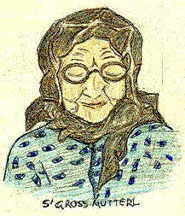Community life in the early years of
the 20th
Century was similar to any other small town in this predominantly Catholic
area - the Oberpfalz of Bavaria. It revolved around the Catholic Church's
calendar year. The feast days of the Church were celebrated with fervor
and enthusiasm. These feasts and festivals were a welcome break from the
daily labor of the
 people. During
the Church Year, there were many pilgrimages taken by the townspeople to
the numerous holy places and shrines that dotted the Bavarian countryside.
people. During
the Church Year, there were many pilgrimages taken by the townspeople to
the numerous holy places and shrines that dotted the Bavarian countryside.
My great-grandmother was a very devout Catholic whose faith had been re-enforced by the tales told each succeeding generation about the turmoils of the religious wars of the 16th Century and the horrors that had been endured by the people during the Thirty Years' War. These were still deeply engrained in the minds of people of her generation. The inhabitants of this area had been forced to convert from one religion to another several times during this period, depending on which religious group and its noble or royal benefactor had the upper hand. Thousands of civilians lost their lives during the Thirty Years' War as armies plundered the Oberpfalz. As a result, whole villages disappeared. At the same time, Plague ravaged the area. Famine was everywhere as armies not only destroyed crops, but also forced townspeople to furnish them with food from their meager resources and to quarter their men, as well. These tragedies left a bitterness in the collective minds of the older people that had endured even to the early 20th Century. My great-grandmother often took care of her grandchildren so that their parents could concentrate on the business of the restaurant and guestrooms. Her availability lightened their load considerably and also gave her the opportunity to instill her strict religious beliefs in her grandchildren. My father fondly recalls his grandmother... |
 "My old grandmother was short,
shrunken by age and hard work. Grandfather, whom I can't remember, died as a
young man. Nobody could convince her to work any less or not at all. She was
untiringly busy with calloused skin and swollen hands..... After she had
passed on her little farm to her son, she lived with us, helping Mother in the
kitchen and doing work for Father in the garden. I loved her very much and I
believe she loved me. She was 93 years old when she went to her eternal rest.
Very religious and wouldn't compromise with anyone on this subject. She told
me a lot about her youth. I wish I could remember all of it." *
"My old grandmother was short,
shrunken by age and hard work. Grandfather, whom I can't remember, died as a
young man. Nobody could convince her to work any less or not at all. She was
untiringly busy with calloused skin and swollen hands..... After she had
passed on her little farm to her son, she lived with us, helping Mother in the
kitchen and doing work for Father in the garden. I loved her very much and I
believe she loved me. She was 93 years old when she went to her eternal rest.
Very religious and wouldn't compromise with anyone on this subject. She told
me a lot about her youth. I wish I could remember all of it." *